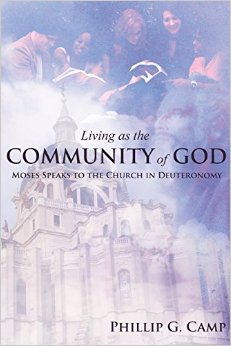 I read the first few chapters of the book, Living as the Community of God. I was hooked.
I read the first few chapters of the book, Living as the Community of God. I was hooked.
The book is basically a commentary on Deuteronomy. Yet, it is so much more. I opened the book and read “Introduction: Why Bother with Deuteronomy.” The author Phillip Camp, Associate Professor of Bible in the Hazelip School of Theology at Lipscomb University, gives the reader ten reasons why the book matters for a Christian. For example:
(1) It shows what it means to be in a faithful relationship with God and invites us into such a relationship.
(2) It highlights the grace of God for his people and for all people.
(3) It teaches a great deal about the nature of God: his love, mercy, justice, righteousness, faithfulness, etc.
The list continues. I was impressed each one of these reasons. The reasons alone made me want to read the book.
What I especially appreciated about the book is that each chapter was well organized and well written. Each chapter had two sections that were particularly interesting. One section was called “The God of the Community.” This section discussed God, and the theology of Deuteronomy and the Bible.
These sections on God were rich! I found much to consider for my own enrichment and growth. I also found many rich nuggets that were helpful in my reflection and could be helpful in preaching/teaching as well.
A few examples:
Faith is built not merely in experiencing the blessing of God but also, even chiefly, in walking with God and trusting that his people will prevail through him, despite glaring obstacles in their path. (p. 13)
However, like Israel, we can allow fear or doubt to cause us to turn our backs on the call and gift of God. We fear not being able to provide food and shelter for ourselves and our families, so we refuse the gift of God’s provision as we seek our own self-sufficiency. (p. 17)
Thus, as a safeguard against forgetting and as a means to be intentional about loving God, Israel is called to actively remember their God and to keep the Torah alive personally, in the family, and in the community. (70)
I also liked the sections entitled “Guidance for Today’s Community.” This section which appeared in each chapter, gave practical guidance, wisdom, and suggestions based on the text in Deuteronomy that was being addressed.
Phillip Camp has written a good book which deserves a wide reading. The book is well written and one that could be helpful to teachers and preachers.